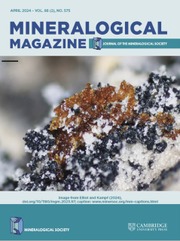Article contents
Tavagnascoite, Bi4O4(SO4)(OH)2, a new oxyhydroxy bismuth sulfate related to klebelsbergite
Published online by Cambridge University Press: 02 January 2018
Abstract
The new mineral tavagnascoite, Bi4O4 (SO4)(OH)2, was discovered in the Pb-Bi-Zn-As-Fe-Cu ore district of Tavagnasco, Turin, Piedmont, Italy. It occurs as blocky, colourless crystals, up to 40 μm in size, with a silky lustre. In the specimen studied, tavagnascoite is associated with other uncharacterized secondary Bi-minerals originating from the alteration of a bismuthinite ± Bi-sulfosalt assemblage. Electron microprobe analyses gave (average of three spot analyses, wt.%) Bi2O3 85.32, Sb2O3 0.58, PbO 2.18, SO3 8.46, H2Ocalc 1.77, sum 98.31. On the basis of 10 O apfu, the chemical formula is (Bi3.74Pb0.10Sb0.04)∑ = 3.88O3.68 (SO4)1.08(OH)2, with rounding errors. Main calculated diffraction lines are [d in Å (relative intensity) hkl] 6.39 (29) 012, 4.95 (19) 111,4.019(32)121,3.604(28)014 and 3.213(100)123. Unit-cell parameters are a = 5.831(1), b = 11.925(2), c = 15.123(1) Å, V = 1051.6(3) Å3, Z = 4, space group Pca21. The crystal structure was solved and refined from single-crystal X-ray diffraction data to R 1 = 0.037 on the basis of 1269 observed reflections. It consists of Bi–O polyhedra and SO4 tetrahedra. Bismuth polyhedra are connected each to other to form Bi–O sheets parallel to (001). Successive sheets are linked together by SO4 groups and hydrogen bonds. Tavagnascoite is the Bi-analogue of klebelsbergite, Sb4O4(SO4)(OH)2, and it is the fifth natural known bismuth sulfate without additional cations. The mineral and its name have been approved by the IMA CNMNC (2014-099).
- Type
- Research Article
- Information
- Copyright
- Copyright © The Mineralogical Society of Great Britain and Ireland 2016
References
- 1
- Cited by


